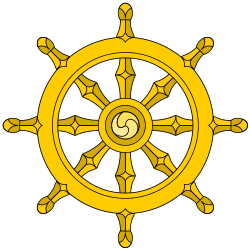Therigatha
| Part of a series on |
| Buddhism |
|---|
 |
|
| Pāli Canon |
|---|
| Vinaya Pitaka |
| Sutta Pitaka |
| Abhidhamma Pitaka |
The Therigatha (Therīgāthā), often translated as Verses of the Elder Nuns (Pāli: therī elder (feminine) + gāthā verses), is a Buddhist scripture, a collection of short poems of early women who were elder nuns (having experienced 10 Vassa or monsoon periods) from around 600 BCE [source?]. In the Pāli Canon of Theravada Buddhism, the Therigatha is classified as part of the Khuddaka Nikaya, the collection of short books in the Sutta Pitaka. It consists of 73 poems organized into 16 chapters. A recent translation has been published by Harvard University Press as part of the Murty Classical Library of India.[1]
It is the earliest known collection of women's literature.
Importance
Despite its small size, the Therigatha is a very significant document in the study of early Buddhism as well as the earliest-known collection of women's literature. The Therigatha contains a passages reaffirming the view that women are the equal of men in terms of spiritual attainment as well as verses that address issues of particular interest to women in ancient South Asian society. Included in the Therigatha are the verses of a mother whose child has died (Thig VI.1 and VI.2), a former sex worker who became a nun (Thig V.2), a wealthy heiress who abandoned her life of pleasure (Thig VI.5) and even verses by the Buddha's own aunt and stepmother, Mahapajapati Gotami (Thig VI.6). An additional collection of scriptures concerning the role and abilities of women in the early Sangha is found in the fifth division of the Samyutta Nikaya, known as the Bhikkhunī-Saṃyutta "Nun's discourse".
A number of the nuns whose verses are found in the Therigatha also have verses in the book of the Khuddaka Nikaya known as the Apadāna, often called the Biographical Stories in English. The majority of these have been translated into the English language.
Translations
- Psalms of the Sisters, tr C. A. F. Rhys Davids, 1909; reprinted in Psalms of the Early Buddhists, Pali Text Society, Bristol; verse translation
- Elders' Verses, tr K. R. Norman, volume II, 1971, Pali Text Society, Bristol
The two translations have been reprinted in one paperback volume under the title Poems of Early Buddhist Nuns, without Mr Norman's notes, but including extracts from the commentary translated by Mrs Rhys Davids.
- Songs of the Elder Sisters, a selection of 14 poems from the Therigatha translated into verse by Francis Booth, 2009, digital edition (Kindle).
- Therigatha: Poems of the First Buddhist Women, translated by Charles Hallisey, Murty Classical Library of India, Harvard University Press (January 2015), hardcover, 336 pages, ISBN 9780674427730.
- Therigatha: Canti spirituali delle monache buddhiste con il commento Paramatthadipani di Dhammapala, traduzione di Antonella Serena Comba, Lulu (Novembre 2016), 513 pages, ISBN 9781326047399.
Online in English
- Theragatha Verses of the Elder Monks
- Therigatha Verses of the Elder Nuns
- Psalms of the Early Buddhists: I. Psalms of the Sisters, London: Pali Text Society, 1909. Caroline A. F. Rhys Davids' 1909 translation of the complete Therigatha.[2]
Footnotes
- ↑ Hallisey 2015.
- ↑ "The 73 songs are organized by length; each is prefaced by Dhammapala's commentary of the 400s CE. The appendix gives translations of 10 songs by theri from another source, the Bhikkhuni-samyutta, apparently contemporary with the Therigatha. Note especially the second section of Rhys Davids' introduction, in which she discusses the lives and beliefs of the theri, and from which you can link to songs that deal with specific themes, e.g., freedom, peace." taken from Other women's voices
Bibliography
- Hallisey, Charles (6 January 2015). Therigatha: Poems of the First Buddhist Women. Harvard University Press. ISBN 978-0-674-42773-0.